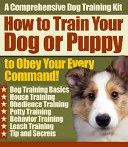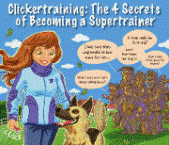Good Dog Training Advice
Get Fast & Simple Dog Training Tips to
Turn a Difficult Dog Into an Obedient Pet!
How to Prevent Inappropriate Urination and Defecation
Believe it or not, as much as 20% of all dog behaviour problems are indicated as elimination issues. That's a lot of people having trouble with their dog's urination and defecation habits. As the dog's owner, changing these behaviours should be at the top of your list. To start with, know that your dog cannot effectively learn to control their urges before they reach 9 weeks of age. Some dogs can learn quicker, but for the most part, house training before a dog reaches full puppyhood can be hard. Why Are They Having Problems The first thing you need to do is to determine why they are suddenly making messes. In some cases, such as with a rescue dog, the animal may never have been trained not to make a mess. However, in other cases, you might have trained them and an outside factor has started it up again. * Medical Issues - Dogs can lose control due to many medical issues. Bladder infections, bladder stones, diabetes, cognitive disorders, gastroenteritis, cushing's disease, or parasites can all cause elimination issues. If you think your dog may be sick, see a vet right away. * Specific Behaviours - In some cases, it might be to mark territory or show dominance over other members of the household. In many cases, neutering can reduce this behaviour, but 40% of neutered dogs with peeing problems will keep doing it. To solve dominance related elimination, you'll need to assert yourself as the pack leader of your home, and completely clean away any spots in your home that have been previously marked with odor neutralizers. * Submissive Urination - Some dogs have the opposite problem and will urinate when they greet people as a sign of submission. This is usually a puppy trait, but can persist into adulthood for some dogs and training a puppy to curb summisive urination should be carried out as soon as this problem is observed. * Separation Anxiety - When a dog makes messes while you're away, it is likely due to anxiety, not because they cannot hold it (unless you're gone for a long time). You can look for other signs in how the dog follows you around the house, reacts when you go to bed, or greets you when you arrive home. How to Prevent or Stop Elimination Problems So, what can you do if your dog is having problems with elimination? Obviously, if your dog has medical problems, the first thing you need to do is go to the vet and make sure they are okay. If that is not the issue, however, there are things you can do to solve the problem. * Regular Schedule - Start by giving your dog a regular eating,exercising time and set a schedule for your dog's elimination. If you have specific times when your dog eats, exercises and goes to the bathroom, the dog will often adjust to the new defecation area. * Provide Opportunities - If you take your dog out twice a day, they will have a hard time retraining. During the training process, you'll need to go out at least 5 times a day, possibly more. * Crating or Confining - If you have an unsuccessful outing or if you need to leave the house, confine your dog or puppy in a space small enough that they won't make a mess. A crate is ideal, though a smaller room or gated area can also work well. * Persistence -Training is always a gruelling process. Be persistent and give your dog time to adapt. If you take a day off yourself, don't expect your dog to continue learning. Trust me when I say your dog does not necessarily want to make a mess at home. It is your job, however, to teach the dog that your home is its den and that messes are not meant for the house. Do that and retraining your dog shouldn't be a problem. For the ULTIMATE Guide to Dog House Training, check out: | |
|


Discover the Secrets to Training Your Dog Or Puppy. Huge BONUSES for a limited time only!
Click here now...
|
http://GoodDogTrainingAdvice.com





